Feminists In Focus
April 5, 2011 by Amy Kronish
Feminists in Focus: Divorce, Deadbeat husbands and DVDs
Literally, “agunot” are women whose husbands have disappeared and it is unknown if they are still alive. This leaves the women in a form of limbo, since it is unclear if they are widows. In these cases, who can determine if they are able to remarry?
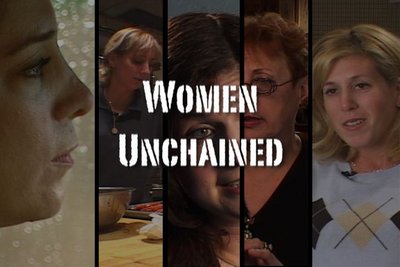 In contemporary usage, the term “agunot” has also come to include women who are unable to obtain a Jewish divorce or “get.” According to Jewish law, based on the Book of Deuteronomy, a woman cannot initiate a divorce; it must be granted to her by her husband. “Agunot” are hostages, chained to deadbeat husbands who are refusing to grant them a writ of divorce.
In contemporary usage, the term “agunot” has also come to include women who are unable to obtain a Jewish divorce or “get.” According to Jewish law, based on the Book of Deuteronomy, a woman cannot initiate a divorce; it must be granted to her by her husband. “Agunot” are hostages, chained to deadbeat husbands who are refusing to grant them a writ of divorce.
In the modern state of Israel, matters of personal status such as marriage and divorce are controlled by the ultra-Orthodox rabbinate which deals with divorce in an archaic manner. Some claim that the rabbinate is not interested in whether or not the husband is justified in withholding his agreement, since they do not interfere or compel these men to behave honorably. As a result and not surprisingly, men within Israeli society have learned how to exploit this advantage in the rabbinic courts. Some men are manipulative and cruel and withhold the divorce in an attempt at vengeance. Others do it for financial gain. Even if the man has moved on and already lives with another woman, he might not be interested in providing his wife with the same degree of independence. In fact, some men actually require that the woman denies her right to communal property, child support and alimony payments in return for his agreement to the divorce, thus actually forcing the wife to “buy” her divorce.
Recently, a new and informative documentary has been produced on the subject, called Women Unchained by Beverly Siegel and Leta Lenik. The women in this film live in both Israel and North America and are plagued by the blackmail being legitimized by the rabbinical courts. The film talks about the toll that is being exacted – the stress, money, turmoil, and emotional pain. An in-depth look at a complex subject, the film even presents the point of view of American law – a wife-beater should be brought up on criminal charges if he demands that his wife drop charges against him in exchange for a get, or if exorbitant amounts of money are demanded in exchange for a get. These are both illegal acts and criminal proceedings should be initiated. The film also provides a creative legal solution to the problem — people are beginning to use pre-nuptial agreements to stipulate how much money the husband must pay during the period of separation until a get is given. (more…)
- 3 Comments
March 13, 2011 by Amy Kronish
Feminists in Focus: Blurring the Line Between Reality and Fantasy in the films of Michal Bat-Adam
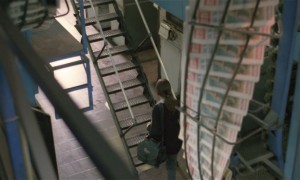 Israeli actress, director and scriptwriter, Michal Bat-Adam, challenges our concepts of reality and fantasy by creating fine lines that delineate between the contemporary reality and memories of the past and between the actress’ real self and the role that she is playing. Bat-Adam has made ten Israeli feature films, all dealing with complex and intense relationships, unique friendships, and passionate loves of women, many of them personal films based on autobiographical elements.
Israeli actress, director and scriptwriter, Michal Bat-Adam, challenges our concepts of reality and fantasy by creating fine lines that delineate between the contemporary reality and memories of the past and between the actress’ real self and the role that she is playing. Bat-Adam has made ten Israeli feature films, all dealing with complex and intense relationships, unique friendships, and passionate loves of women, many of them personal films based on autobiographical elements.
In her most recent film, Maya, Bat-Adam takes a look at how an aspiring actress can become overly emotionally involved with her first role, to the point that it takes over her rational life and affects everything around her. Maya lands a major role in the theater, playing a young woman who goes crazy when her parents force her to have an abortion. The script of the play is written by the stage director, with whom Maya becomes involved. As Maya is becoming obsessively involved with her character, she goes to a mental hospital to learn more and she begins to see things in a radically different way from the director/scriptwriter/lover. Slowly, it becomes apparent that Maya can’t stop herself from actually becoming her character, and from interpreting her role in her own way. (more…)
- 1 Comment
February 7, 2011 by Amy Stone
Feminists in Focus: Reporting back from the New York Jewish Film Festival ‘Yolande: An Unsung Heroine’ – the Egyptian Jewish spy – and ‘Red Shirley’
At the 20th New York Jewish Film Festival, presented by The Jewish Museum and the Film Society of Lincoln Center (through Jan. 27).
“Yolande: An Unsung Heroine”
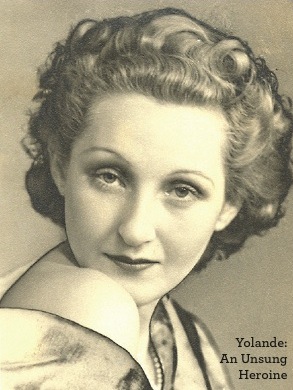 Well before Mubarak, when Egypt had a king, and pashas and spies gathered on the balcony of Cairo’s Grand Continental Hotel, Yolande Gabai de Botton was gathering intelligence for the embryonic Jewish State.
Well before Mubarak, when Egypt had a king, and pashas and spies gathered on the balcony of Cairo’s Grand Continental Hotel, Yolande Gabai de Botton was gathering intelligence for the embryonic Jewish State.
The French-educated child of a Jewish-Egyptian family, Yolande was the beautiful blonde internationalist, risking both her son’s life and her own as a spy, operating a network of informers including an agent within the Muslim Brotherhood. Her contacts were so good that she got the Arab League minutes before the Arab League secretary.
Yolande used her work as a journalist as cover for reporting on Cairo’s power elite – right up to the king — for Israel’s pre-state de facto government, the Jewish Agency. She reported directly to Teddy Kollek, the future long-time mayor of Jerusalem, back when he headed intelligence for the Jewish Agency. (more…)
- 1 Comment
January 26, 2011 by Amy Kronish
Feminists in Focus: Valley of Fortitude (Gei Oni)
Dan Wolman’s newest film, Valley of Fortitude (Gei Oni), is a literary adaptation that combines history and romance
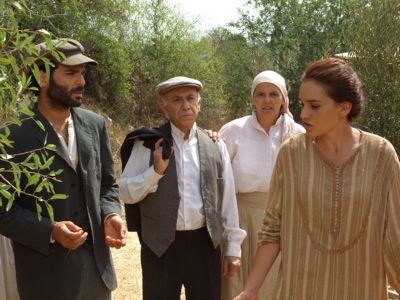 Dan Wolman is one of Israel’s veteran artistic filmmakers. Since his early literary adaptation, My Michael, based on a novel by Amos Oz, he has produced only auteur films (scripted and directed by the filmmaker). His latest film Valley of Fortitude (Gei Oni), which recently opened in theaters in Israel, is another adaptation, based on the best-selling historical novel by Shulamit Lapid.
Dan Wolman is one of Israel’s veteran artistic filmmakers. Since his early literary adaptation, My Michael, based on a novel by Amos Oz, he has produced only auteur films (scripted and directed by the filmmaker). His latest film Valley of Fortitude (Gei Oni), which recently opened in theaters in Israel, is another adaptation, based on the best-selling historical novel by Shulamit Lapid.
The story takes place during the late 19th century, a period of Jewish history in which waves of Jewish migration left Russia and the Ukraine mostly for America. A smaller number of immigrants went to Palestine.
Combining the historical narrative with a love story, the film tells the story of Fanya (Tamar Alkan), a young woman who arrives on the shores of Palestine with a little baby, accompanied by her aging uncle and her emotionally scarred brother. They are running from Russia, having lost all of their family in a terrible pogrom. (more…)
- 3 Comments
January 26, 2011 by Amy Stone
Feminists in Focus: Reporting back from the New York Jewish Film Festival ‘Grace Paley: Collected Shorts’ and ‘As Lilith’
At the 20th New York Jewish Film Festival, presented by The Jewish Museum and the Film Society of Lincoln Center (through Jan. 27).
“Grace Paley: Collected Shorts”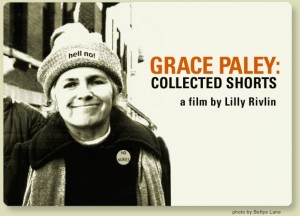
How does a Jewish feminist filmmaker celebrate success, long time a-coming? In the case of Lilly Rivlin, generously.
In black boots and glittering red jacket, Rivlin was the proud mother, making sure everyone involved with “Grace Paley: Collected Shorts” got credit. She turned the New York Jewish Film Festival post-screening Q&A into a moment of oral history, calling on anyone in the audience with a story to tell about Grace Paley to share it. And they did.
The 75-minute film. completed in 2010, is a valentine to the beloved writer, anti-war activist, wife and mother who died of breast cancer in 2007 at the age of 84. A film needs tension, Rivlin said during the post-film discussion, as reason for including writer-critic Vivian Gornick’s crack that Paley was no feminist.
Aside from that one remark, there’s no tension, just appreciation in interviews with political activists, writers, past students at Sarah Lawrence, her second husband, her daughter. Best of all is the diverse footage of Paley speaking for herself and in action. There’s the infamous PEN writers’ meeting chaired by Norman Mailer. The man shamelessly relegated women to the sidelines while elevating then-Secretary of State George Shultz under Reagan to center stage. Of course Paley was part of the women’s protest. (more…)
- 2 Comments
January 25, 2011 by Judy Gerstel
Feminists in Focus:"Barney's Version" and the Men We Know
 “Barney’s Version,” the screen adaptation of Mordecai Richler’s novel, is as much an archeological artifact as it is a film.
“Barney’s Version,” the screen adaptation of Mordecai Richler’s novel, is as much an archeological artifact as it is a film.
This is what it was like for us, Jewish women who grew came of age early in the second half of the last century.
We knew men like Barney (Paul Giamatti) and his irascible, incorrigible father (Dustin Hoffman).
We dated them. We married them. And, like two of Barney’s wives, we divorced them.
But it’s not just the character of Barney or the Jewish men in the movie that revive the era for us.
It’s the way Jewish women are portrayed and stereotyped. (more…)
- No Comments
January 21, 2011 by Amy Stone
Feminists in Focus: Reporting back from the New York Jewish Film Festival 'The Klezmatics: On Holy Ground'
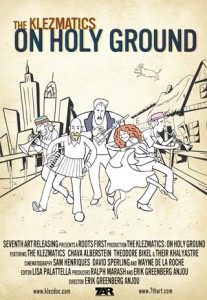 At the 20th New York Jewish Film Festival, presented by The Jewish Museum and the Film Society of Lincoln Center (through Jan. 27).
At the 20th New York Jewish Film Festival, presented by The Jewish Museum and the Film Society of Lincoln Center (through Jan. 27).
For any woman musician who’s fantasized about being the only babe in the band, “The Klezmatics: On Holy Ground” is a cautionary tale not to be taken lightly.
The Klezmatics describe themselves as a dysfunctional family. In a music industry falling apart, they went from winning a Grammy to firing the agent who helped make it happen, to seeing their record label go out of business, the office replaced by a methadone center. They’ve gone from being one of the first neo-klezmer bands back in the ‘80s to bringing the music back to Germany and Poland and they’ve performed before capacity audiences at Town Hall in New York City and Walt Disney Concert Hall in L.A. They’re in their glory on a big stage with an expanded band, Oriental carpets covering the floor and a starry night backdrop behind them.
Members come and go, including original fiddler Alicia Svigals, but some of the original founders are still with the band after 24 years. All this is chronicled by filmmaker Erik Greenberg Anjou (“A Cantor’s Tale” 2005), who followed the band’s highs and lows for more than three years. (more…)
- No Comments
January 17, 2011 by Amy Stone
Feminists in Focus:Reporting back from the New York Jewish Film Festival ‘My So-Called Enemy’ and ‘The Human Resources Manager’
At the 20th New York Jewish Film Festival presented by The Jewish Museum and the Film Society of Lincoln Center (through Jan. 27).
 Don’t expect a feel-good movie from “My So-Called Enemy” – the documentary following Jewish Israeli and Palestinian teen-age girls in the U.S. for a 10-day “Building Bridges for Peace” program back in 2002.
Don’t expect a feel-good movie from “My So-Called Enemy” – the documentary following Jewish Israeli and Palestinian teen-age girls in the U.S. for a 10-day “Building Bridges for Peace” program back in 2002.
Director Lisa Gossels has dedicated a chunk of her life to following six of the 22 girls to the leadership retreat in New Jersey then back home to Tel Aviv, Haifa, East Jerusalem and the West Bank over the next seven years.
The 90-minute documentary opens with urgent texting between Jewish Israeli Gal and Christian Palestinian Rezan. It ends with their determination to remain connected as they stand dwarfed by a towering cement security wall separating Rezan’s village from East Jerusalem. Gal, the pro-Palestinian rebel in her religious family, has become a sergeant in the Israeli army. She changed out of her uniform for the meeting.
Not a pretty picture, but not without hope.
Some of girls bond their first day in New Jersey over the weirdness of American broccoli pizza. In a joyous dance scene, some of the Jewish girls overcome their fear of the kaffiya’s symbolism, with one girl seductively waving it as she undulates to the music. Quite a moment since they’re all coming out of the bloody violence on all sides of the Second Intifada. (more…)
- No Comments
January 13, 2011 by Amy Stone
Feminists In Focus: ‘Mahler on the Couch’ Without Jewish Guilt at the New York Jewish Film Festival
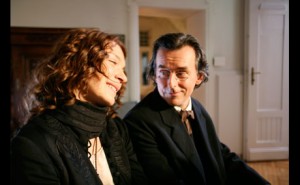 How refreshing to have the New York Jewish film festival open on Wednesday (Jan. 12) with an offering where the guilt is not Jewish. In “Mahler on the Couch,” the guilt emanates from the male ego of a musical genius (Gustav Mahler) suppressing the musical creativity of his wife – the much younger and super sexual Alma.
How refreshing to have the New York Jewish film festival open on Wednesday (Jan. 12) with an offering where the guilt is not Jewish. In “Mahler on the Couch,” the guilt emanates from the male ego of a musical genius (Gustav Mahler) suppressing the musical creativity of his wife – the much younger and super sexual Alma.
Mahler has been driven to the couch of Sigmund Freud by a love letter to his young wife from the even younger Walter Gropius, the future creator of Bauhaus.
Yes, Freud was Jewish. Mahler converted from Judaism to Catholicism. Several marriages and many affairs later, Alma Mahler Gropius Werfel was the Nazi-loving wife of a Jew who escaped with her from Vienna to Hollywood. But we’re getting way, way beyond the scope of the film.
How delightful to come in from the January snows of New York to the lushness of Vienna in the 1900’s when everything was being invented – psychoanalysis, Secessionist art and architecture, Mahler’s and Schoenberg’s music. When it was too early to worry about the Fascists and the Nazis or even World War I. (more…)
- No Comments
January 3, 2011 by Elizabeth Mandel
Feminists In Focus: The Market For Organ Trade
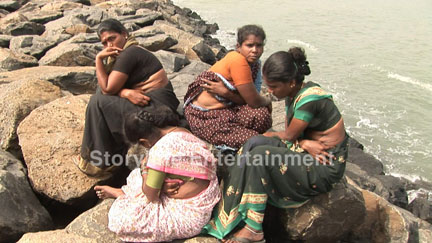 I recently returned from the International Documentary Film Festival Amsterdam, Europe’s premier documentary film festival. It seemed apt, in a city infamous for its offering of everything for sale, to see Rama Rau’s “The Market,” the story of Sandra, a Canadian single mother desperately in need of a kidney, and the residents of a slum on the outskirts of Chennai, India, who are offering their kidneys for sale.
I recently returned from the International Documentary Film Festival Amsterdam, Europe’s premier documentary film festival. It seemed apt, in a city infamous for its offering of everything for sale, to see Rama Rau’s “The Market,” the story of Sandra, a Canadian single mother desperately in need of a kidney, and the residents of a slum on the outskirts of Chennai, India, who are offering their kidneys for sale.
I intentionally avoided writing “the residents…who are willing to sell,” because “The Market” skillfully raises and explores the question of what “willing” means, when there are no choices. For the people — primarily women — of Villivakkam, the commodification of their bodies is their only option; they must sell off the one thing they possess in order to keep themselves and their families alive. This question has been often explored in relation to sex work: when a woman, lacking opportunity, education, status and access to resources “chooses” prostitution, is it really a choice? In the words of one of the men who has sold his kidney, “We are fishermen by birth, we used to sell parts of the fish in the market but now we cut and sell parts of ourselves. They have made us the market.” (more…)
- 2 Comments
 Please wait...
Please wait...